A Generational Shift in Duke's Workforce
From Gen Z to baby boomers, Duke staff and faculty bring varied perspectives to the future of work
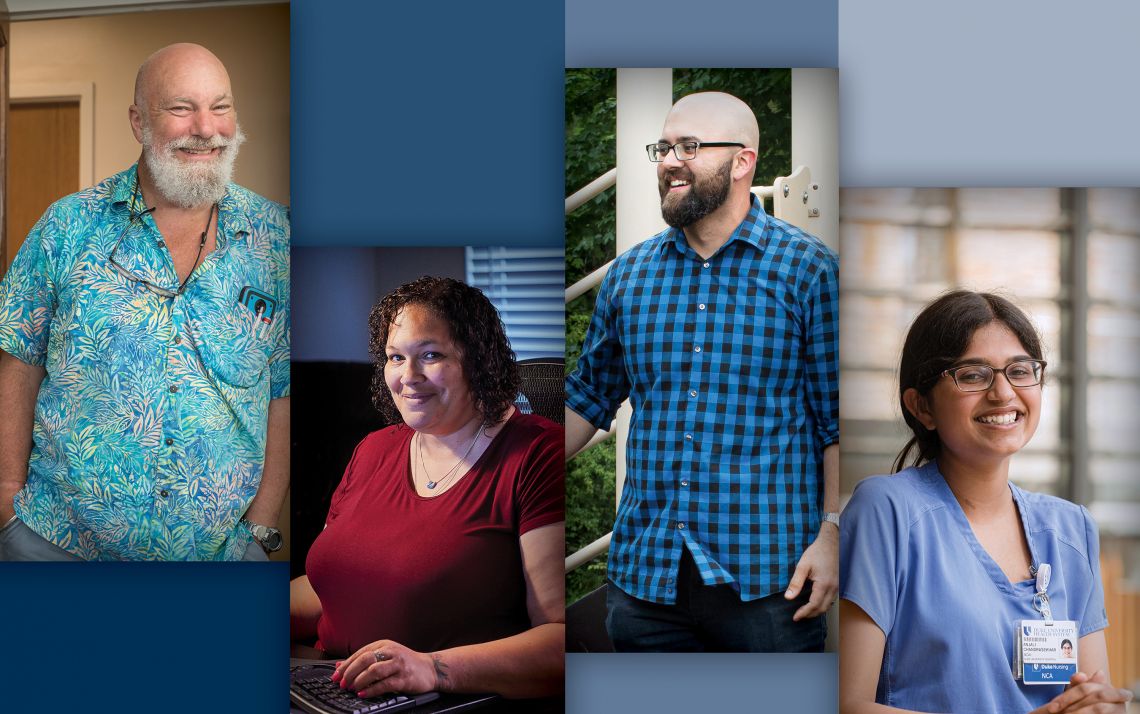
Since 2007, Jacqueline Looney, former senior associate dean for the Graduate School at Duke, kept a small index card labeled “JL’s Long-term Goals” in her wallet.
The first goal listed on the dog-eared card read, “maintain excellent physical, spiritual, & mental health.” Others included using her skills and experience to serve her community and writing spiritual devotionals.
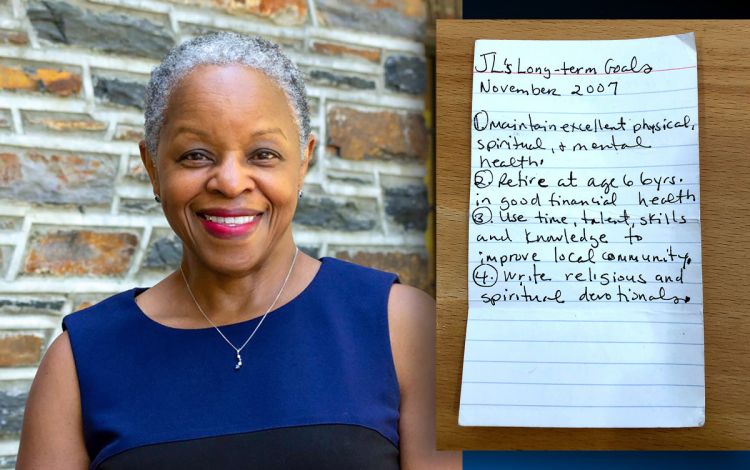 The most concrete goal: “retire at age 66 years in good financial health.”
The most concrete goal: “retire at age 66 years in good financial health.”
In 30 years at Duke, Looney recruited brilliant students from underrepresented populations and created a network of support services to help students thrive. After the pandemic, and with a strong, stable team around her, Looney followed through and retired this June at age 66, adding to a generational shift that’s occurring in Duke’s workplace and beyond.
“At some point, you come to the realization that this has been good work, and you made a difference, but someone else can come in and have a fresh perspective and do things differently,” Looney said. “That kind of thinking is what we should have, and what our colleagues should expect from us.”
At Duke, the number of monthly retirements so far in 2022 is outpacing 2021, illustrating the exodus of older workers that, while expected, was hastened by the pandemic. According to research economists for the Federal Reserve Bank of St. Louis, during the first two years of the pandemic, when many workplaces changed and the future seemed uncertain, the number of Americans who retired exceeded pre-pandemic projections by 2.6 million.
As a result, younger generations are filling the void. Since 2016, millennials have been the largest generational cohort in the country’s workforce. And at Duke, millennials – those born between 1980 and 2000 – went from being 21 percent of the workforce in 2012, to 47 percent in 2022.
Daniel Nagy, a former Fuqua School of Business associate dean who leads workshops on generational differences for business organizations and the Duke Leadership Academy, said the rise of millennials, and new ways of working during the pandemic, are fueling an evolution of the American workplace. As a result, he explained, employers are embracing more flexible work arrangements and improved work-life harmony to recruit and retain talent.
“You can really see a change in attitudes toward work, especially among younger workers,” Nagy said. “And they’re really driving things now. You had the boomers and older workers, who are used to working 50-60 hours a week because they felt that just came with the territory. And now younger people are saying, ‘Not so fast.’”
Across Duke, staff and faculty – from baby boomers pondering retirement to the roughly 237 members of Gen Z who are starting their careers – came out of the pandemic reflecting on how their jobs fit within their lives. Whether they have a set plan, like former Graduate School Associate Dean Jacqueline Looney, or an undefined path ahead, their aspirations will shape what comes next for Duke.

Baby Boomer
Enjoying the Ride
Dr. Robert Brown, 67
Lecturer of Physics
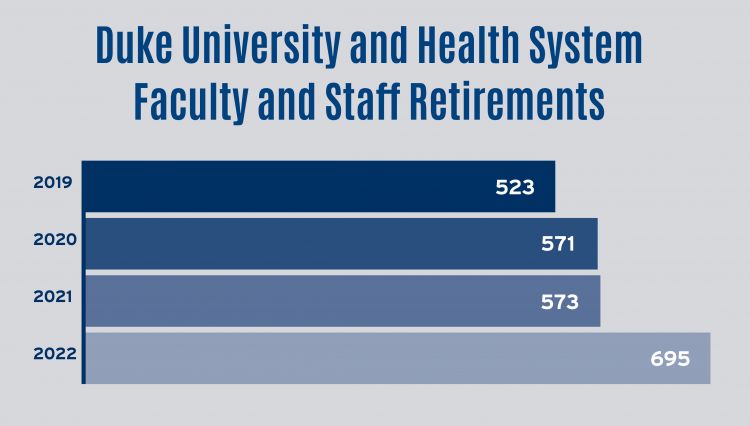 How the past few years shaped his path: Duke has been Robert Brown’s home for nearly 50 years. After arriving as a student in the 1970s, he’s spent the past four decades designing powerful computing systems for his research on quantum mechanics, and teaching on campus in the Physics Building and at the Duke University Marine Lab in Beaufort. Along the way, Brown has developed a team-based teaching style that ignites in his students the same fascination he finds in physics. When the pandemic struck, Brown adapted his teaching again, making lessons more efficient for hybrid and remote students. “I think I’ve found a good way to teach,” Brown said. “It’s rewarding when the students have fun and get enthusiastic.”
How the past few years shaped his path: Duke has been Robert Brown’s home for nearly 50 years. After arriving as a student in the 1970s, he’s spent the past four decades designing powerful computing systems for his research on quantum mechanics, and teaching on campus in the Physics Building and at the Duke University Marine Lab in Beaufort. Along the way, Brown has developed a team-based teaching style that ignites in his students the same fascination he finds in physics. When the pandemic struck, Brown adapted his teaching again, making lessons more efficient for hybrid and remote students. “I think I’ve found a good way to teach,” Brown said. “It’s rewarding when the students have fun and get enthusiastic.”
What is important moving forward? Brown knows retirement will include plenty of saltwater fishing and time at his family’s second home in the small coastal community of Marshallberg. However, with his heart in teaching, he plans on staying at Duke for at least five more years. A College and University Professional Association for Human Resources (CUPA-HR) national survey shows that roughly one-third of full-time faculty over 50 said the pandemic changed their retirement plans; roughly 25 percent say they’ll retire later and about 11 percent said sooner. While Brown could retire, he’s not ready to give up the joy of teaching Duke students. “This is home,” Brown said. “I’ve been here almost 50 years, so how could I not love it?”
Baby Boomer
Refreshed View of Retirement
Holley Broughton, 62
Communications Strategist, Duke Orthopaedic Surgery
How the past few years shaped her path: Holley Broughton, who had previously served as marketing and communications director for an area private school, had been at Duke Orthopaedic Surgery for two months when COVID-19 forced her to work remotely. Looking back at time at home during quarantine, she jokes that she enjoyed all of the cliché pandemic pastimes alongside her teenage daughter such as baking bread, tending a garden and making mixed-media art. Prior to the pandemic, Broughton viewed retirement as a far-off, abstract idea. But spending time at home with family during the pandemic revealed what her retired life could look like. “I think I sort of saw all the things I could do if I someday retired,” Broughton said.
What is important moving forward? With a hybrid work arrangement, Broughton is in no rush to leave Duke. She enjoys her colleagues and cherishes opportunities to find new ways to share stories of their work, whether through videos or social media such as TikTok. While she expects to work several more years, she’s excited about what’s waiting up the road. “While I don’t plan to retire anytime soon, the lightbulb did begin to flicker a little,” Broughton said. Najla McClain, Duke University School of Nursing program coordinator and co-convener for the Fulfillment & Purpose core for Healthy Duke, said it’s common for people to imagine what’s next as they get deeper into their careers. “As we get older, we start balancing our work with what we have going on outside,” McClain said. “Often what’s happening outside of work becomes more important.”
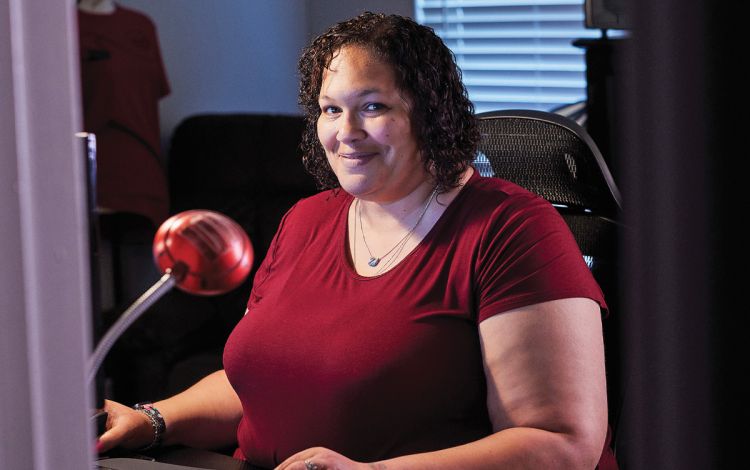
Generation X
A New Home
Karima Blaize, 48
Senior International Student & Scholar Advisor, Duke Visa Services
How the past few years shaped her path: As a lifelong New Yorker, Karima Blaize had no plans to leave the city she adored. But when her mother Verna, who lived in Holly Springs and served as the sole caregiver for Blaize’s 90-year-old grandmother, Constance, died in 2019, Blaize changed course, moved to North Carolina, and eventually landed a position at Duke Visa Services in 2021. For fellow members of Gen X – born between 1965 and 1979 – such moves aren’t particularly common. According to a 2022 Microsoft report, 52 percent of millennial and Gen Z workers are considering a job change, compared to 35 percent for Gen X and baby boomers. “I wasn’t ready to switch jobs. When I did, it was out of necessity,” said Blaize, who’s helped Duke students, scholars, and staff from places such as China, India and Togo navigate immigration challenges. “But I really like Duke. I’m happy where I am.”
What is important moving forward? While mild winters and laid-back vibes feel new, Blaize said she’s come to feel at home in North Carolina. And she’s content in her role at Duke, where a hybrid work arrangement allows her to stay closer to her grandmother. Professional development opportunities, such as technical development courses available through Duke‘s Learning & Organization Development, a unit in Human Resources, have her thinking about where her career could go at Duke. She said she’d love to eventually pursue a master’s degree in law in the future. “I feel like there’s always room for growth,” she said. “No one is ever at a place where they can’t learn something new.”
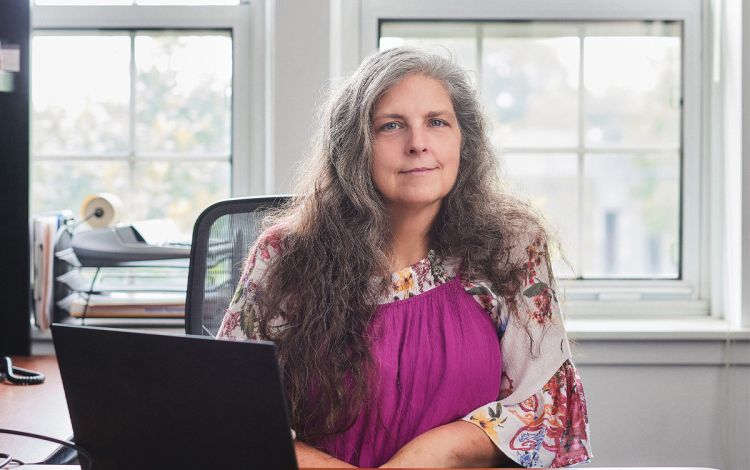
Generation X
Embracing Flexibility
Stacy Weiss, 51
Assistant to the Director of Graduate Studies, Department of Asian & Middle Eastern Studies
How the past few years shaped her path: For much of her 21 years at Duke, Stacy Weiss planned on retiring in 2024, when her age and years of service made her eligible for Duke’s retiree medical insurance. But when she began working from home during the pandemic, plans changed. Without a daily 90-minute roundtrip commute between campus and her Youngsville home, and with the ability to work with her two dogs and six cats, staying at Duke longer grew appealing. “There is a level of freedom you have not coming to the office every day,” said Weiss, who works remotely two or three days each week.
What is important moving forward? With less commute time, Weiss’ flexible work arrangement with the Department of Asian & Middle Eastern Studies has improved her work-life balance. While workplace flexibility is something younger workers prize, Gen X workers such as Weiss have come to appreciate it, too. A 2022 AARP survey shows that 77 percent of remote or hybrid workers 50-and-older, prefer it. “The younger millennials and Gen Z are really driving the change in the workforce now, but the older workers are going along with the changes because it gives them the ability to have more balance,” said Nagy, the former Fuqua School of Business associate dean who studies multi-generational workforces.
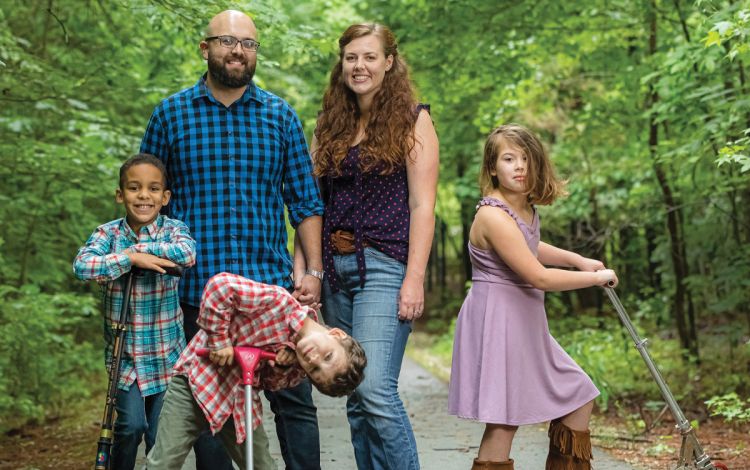
Millennial
Adjusting Life Priorities
Fernando Orozco, 36
Assistant Director of Operations, Duke University Division of Laboratory Animal Resources
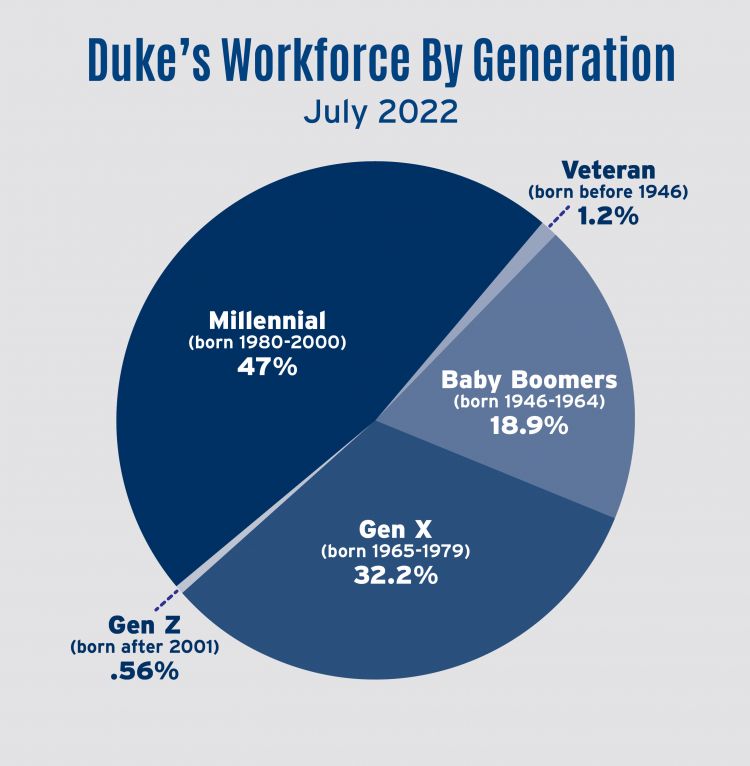 How the past few years shaped his path: Early in the pandemic, Fernando Orozco had an epiphany as he watched his three children – ages 6 to 8 – play in a waterfall at Hanging Rock State Park. “We need to do this more,” he said to himself. In the early days of COVID-19, he had recently been named assistant operations manager of Laboratory Animal Resources, a position that came with managing 10 staff members. He was also working on a master’s degree in Business Administration at the University of Mount Olive. After finishing the degree in August 2020, he began reassessing priorities, with more time to spend with his family. “The pandemic made me tap the brakes on my career and realize what are my priorities,” said Orozco, who is among nearly 20,000 millennial employees at Duke born between 1980 and 2000. “My family has always been important to me, but I have learned to appreciate it more.”
How the past few years shaped his path: Early in the pandemic, Fernando Orozco had an epiphany as he watched his three children – ages 6 to 8 – play in a waterfall at Hanging Rock State Park. “We need to do this more,” he said to himself. In the early days of COVID-19, he had recently been named assistant operations manager of Laboratory Animal Resources, a position that came with managing 10 staff members. He was also working on a master’s degree in Business Administration at the University of Mount Olive. After finishing the degree in August 2020, he began reassessing priorities, with more time to spend with his family. “The pandemic made me tap the brakes on my career and realize what are my priorities,” said Orozco, who is among nearly 20,000 millennial employees at Duke born between 1980 and 2000. “My family has always been important to me, but I have learned to appreciate it more.”
What is important moving forward? Orozco said flexibility and work-life balance will be most important for long-term contentment at Duke, a preference that matches a Bankrate survey that lists flexible work arrangements as a top career priority for millennials. Orozco and his family share a farm in Rougemont with six goats and 20 chickens. His wife, Lindsay, teaches their children at home. “I have more flexibility to work from home when needed, but the nature of the job still requires a physical presence on campus,” said Orozco, who has worked at Duke for 13 years. While he isn’t shying away from career advancement and more responsibility, Orozco wants to ensure what comes next fits within family priorities. “For me,” he said, “family is the most important thing.”

Millennial
New Growth Opportunities
Karina Goicochea, 30
Certified Medical Assistant for Duke Orthopaedics at Arringdon
How the past few years shaped her path: Karina Goicochea, a certified medical assistant at Duke Orthopaedics Arringdon, began helping at COVID-19 testing and vaccine sites after the pandemic hit. She checked people in, scheduled appointments, administered vaccines and did anything else asked of her. The change of pace during a crisis lifted her out of a comfort zone that typically involved assisting on procedures to relieve muscle, ligament and tendon pain, and opened her eyes to new career opportunities. “I’ve gotten the opportunity to be all over the place,” Goicochea said.
What is important moving forward? While her plans are still coming together, Goicochea expects to transition to a research role in the coming months, administering treatments to patients in larger clinical trials. It’s a new journey that will allow her to forge a long-term relationship with patients. She also wants to begin pre-requisites to attend nursing school for a new role at Duke. According to Nagy, who studies multi-generational workforces, it’s not uncommon for millennials to seek new challenges. “Millennials are at an age where many of them want to take on greater responsibilities, which they feel they deserve,” he said. While 38 percent of millennials plan to stay in their job beyond the next five years, according to a Deloitte Global 2022 Gen Z and Millennial Survey, Goicochea would like to remain at Duke, citing health and financial benefits and professional development opportunities. “I want to do something different, that comes with the excitement of learning something new, compared to just that one category that I’m familiar with now,” she said.

Generation Z
Expanding Her Horizons
Anjali Chandrasekhar, 19
Nursing Care Assistant, Duke University Hospital
How the past few years shaped her path: While front-line health care careers are challenging, Anjali Chandrasekhar couldn’t wait to get hers started. Since January 2022, the University of North Carolina at Chapel Hill sophomore, who is studying neuroscience, has worked 12-hour shifts Friday, Saturday and Sunday nights in Duke University Hospital’s neuroscience step-down unit. Duke employs 237 members of Gen Z – people born in 2001 or later. In the coming years, those numbers are expected to grow. Chandrasekhar’s full-time position at Duke involves checking vital signs and assisting patients, and helps her pay for tuition and provides first-hand experience for what she hopes will be a long medical career. “It’s eye-opening,” Chandrasekhar said. “I can learn about neurological conditions in the classroom, and then see how they manifest in actual patients.”
What is important moving forward? While Chandrasekhar’s post-college plans aren’t set, she’d like to stay at Duke, where she’s inspired by the passion and commitment she sees in her colleagues. “There’s a certain standard of excellence at Duke that I see in the nurses and people I work with,” Chandrasekhar said. “We take a lot of pride in the care we give.” Chandrasekhar isn’t alone in having her values define her path. A 2021 Deloitte Global survey shows 49 percent of Gen Z respondents made career choices based on personal ethics. “It’s great to see,” said Duke School of Nursing’s McClain, a Healthy Duke co-convener. “I always feel like we’re in good hands moving forward with people who want to put their whole selves into their work.”
By Stephen Schramm and Jack Frederick
Got news in your school, department or unit? Share it with us.